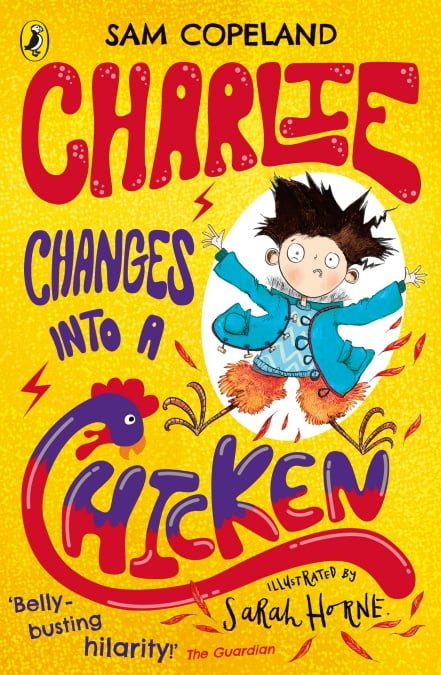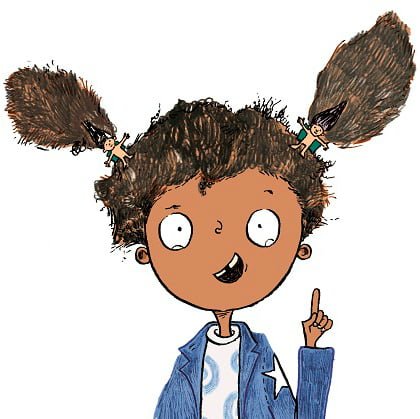Sam Copeland is an author and a literary agent and director at Rogers, Coleridge and White. He works as a chicken whisperer, travelling the world using his unique gift to tame wild chickens. Charlie Changes Into a Chicken is his first book. He has threatened to write more…
Without giving too much away, can you tell us about Charlie Changes Into a Chicken and what inspired you to write this story?

It’s a book about a boy that changes into all sorts of animals whenever he feels anxious or stressed. Over the course of the book Charlie, with the help of his friends, begins to control his power by learning how to cope with his stress. And my own childhood is inextricably linked with Charlie’s story. . .
There’s a lovely scene at the beginning of the story, where Charlie receives some bad news and then retreats under his duvet with a book. What role do you feel books play in our lives?
For the lucky ones, books play a huge part in our lives. Certainly, for me, they have been the backdrop to my life, and has given me two separate careers.
I particularly enjoyed the part in the story where you encourage your readers to ‘keep imagining Charlie however you want’. Why was this important to you to include?
I think this came from a strange blind spot I have. When I’m reading books, I often don’t envisage the characters. They exist in my mind as words, and as an idea, but not as a picture. So when writing, I wanted to keep Charlie that way.
Flora is a wonderful character and role-model! I love how she takes charge of situations and outsmarts the boys at every turn. Can you tell us a bit more about her and why she’s such an important part of the story? What do you hope your readers might learn from her?

I love Flora. I love how much she cares for Charlie. I love how she is smart and strong. I’m not sure I’d want readers though to learn anything from her though. I’d just like readers to like her.
Much of the humour in the story comes from the footnotes. Why did you decide to include footnotes in the story, rather than say having the information in brackets alongside the main story?
I rather like the sidetracks they add to the story. But they aren’t necessary to read. I realised that younger children might skip them altogether, which is fine, but it might give older children (and adults!) an extra dimension of enjoyment.
What was it like seeing your words turned into such striking illustrations and artwork by Sarah Horne? What do you feel her illustrations bring to the story?
Indescribable. Seeing Sarah’s illustrations was the best thrill. She just nails the characters. They are so rich and full of humour, and drawn with such obvious caring and enjoyment – I couldn’t have asked for a better job.
Despite advising your readers not to take this story too seriously and telling them it’s just ‘a ridiculous book’, the story tackles some quite hard-hitting themes, such as anxiety, illness and bullying. How important was it for you to balance the laugh-out-loud moments with these issues? You manage to strike a balance between funny and poignant – was this difficult?
It was absolutely crucial for me to touch on this stuff. Each of the three Charlie books I have written touch on a difficulty I faced in my childhood, so I had to put it in. But I only wanted to touch on it lightly. I was terrified of being heavy-handed. And balancing with humour I suppose came quite naturally to me. My childhood – one way or another – was full of laughter. It’s how I dealt with things. Indeed, the book is dedicated to my father, who taught me how to laugh in the face of terrible adversity.
I have to ask…If you could change into any animal, what would it be and why?
I really should have an answer to this ready to go. But… perhaps some sort of bacteria that exists inside the human body. That would be so alien. And would give a hugely different perspective on life.
You rather hilariously describe Charlie’s teacher, Arthur Wind, who always seems to be on his phone or shouting. Did you have a favourite teacher at school?
I had a teacher called Mrs Smith in junior school. She was lovely – and that’s when my reading took off.
At the end of the story, you describe how writing this book was a ‘pretty dreadful experience’. What was your favourite part about writing Charlie Changes Into a Chicken? What was your least favourite part?
My favourite part was discovering the friendship between the main characters. And finding a good joke feels a little like finding a nugget of gold. My least favourite part? Those days when writing is slow, the jokes aren’t there and everything feels like wading treacle.
Finally, can you describe Charlie Changes Into a Chicken in three words?
- ‘No, I can’t’
- ‘Boy becomes chicken’?
- ‘So much poo’?
Joking aside, I’m not sure I can. I think I’d have to let readers describe it!

